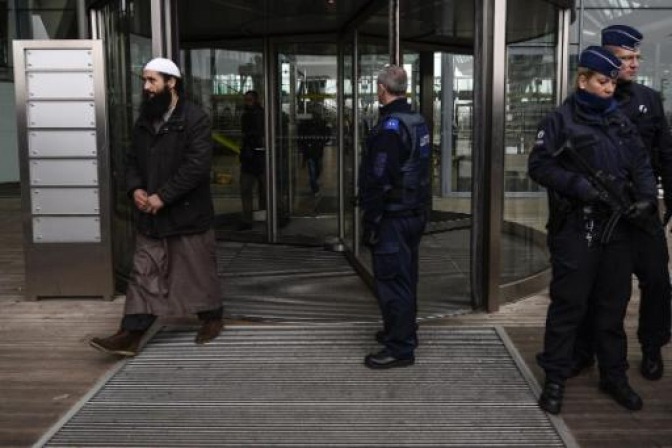Belgium's anti-terrorism unit has confirmed that there have been contacts between the Islamic radical group, Sharia4Belgium, and fellow supporters in the UK as well as in France, the Netherlands and Spain. One alleged "common denominator" between the two organisations is a British cleric who is credited with helping set up Shariah4Belgium, which campaigns for sharia law in Belgium.
The cleric cannot be named for legal reasons but, three years ago, Molenbeek, the Brussels suburb initially at the centre of police investigations into the Paris attacks, was hit by major riots which are thought to have been orchestrated from the UK.
It is believed that Sharia4UK, an organisation similar to Sharia4Belgium, was instrumental in organising the trouble.
Belgian prosecutors have linked Sharia4UK to Fouad Belkacem, the founder of Sharia4Belgium. In May, Belkacem was sentenced to 12 years in prison after being found guilty of leading a terrorist group.
It was reported that one of the suspects in the same trial in Antwerp had unfettered access to some of the most sensitive sections of the Doel nuclear power plant in Belgium until he left to fight in Syria in 2012.
As well as Belkacem, the authorities in Belgium have had some limited success in their attempts to combat Islamic radicalism in the country. In June 2013, the Antwerp Appeal Court sentenced the former spokesperson of Sharia4Belgium to an 18 month sentence for incitement to hatred.
But, despite being officially disbanded by the authorities as far back as 2012, Sharia4Belgium has continued to exert a growing influence and the Belgian Muslim extremist Abdelmajid Gharmaoui was identified as being among the cold-blooded killers clearly seen in a recent Islamic State video.
Gharmaoui, a 28-year-old Belgian from the Flemish town of Vilvoorde, is known to have been a member of Sharia4Belgium and have links to radical groups across Europe.
He left for Syria in October 2012, saying he wanted to fight Jihad, and was last placed in the village of Dabiq, where the video was recorded.
Hans Bonte, the mayor of Vilvoorde said at the time that there was a huge local problem with 'youths being radicalised' in Vilvoorde and pointed out he had introduced a bill to withdraw the travel documents of suspected jihadists who want to travel to war-torn countries such as Iraq and Syria.
Meanwhile, the head of the Belgian state intelligence service, Jaak Raes, says that Belgian Syria fighters are "more professional and better organised than initially thought."
He said, "We shouldn't underestimate them: they are better organised than we may think and are smart, as their escape routes prove. They all have contact with one another and if someone leaves for Syria, he keeps in touch with friends staying behind in Belgium, trying to convince them to join the fight and take up the weapons, or, in a worse scenario, to stage a terror attack at home, in Belgium, to prove what he's capable of."
He said it was difficult for the state security department to keep track of all Belgian jihadists moving abroad, adding, "They use different routes, which have also been adapted on various occasions. We not only have to focus on Belgium, but also on airports abroad."
At least 500 Belgians are thought to have left for Syria so far. Belgium has one of the highest numbers of jihadists in Europe taking into account its relatively small population of 11 million.
This "record number" can be explained by the campaign organised by Sharia4Belgium to recruit fighters, Raes said. "We think that this organisation was able to convince many people to make the journey and to join IS."
So far, 77 of the 500 recruits are known to have died, while 122 have already returned to Belgium. Raes says that intelligence services suspect that 70 per cent of the Belgians that left for Syria, joined IS.
"They can be found in any location where IS is active."
Raes sees two main groups among Syria fighters that have returned to Belgium. "One group is disillusioned, because they didn't find in Syria what they were hoping to find. Others come back with a plan and are familiar with how to use weapons and violence."
Only the latter group is dangerous, says Raes. "They deserve our particular attention. We will keep monitoring them."
According to a recent United Nations report those that recruit young men in Belgium to go and fight with IS are paid between €1,000 and €9,000 per recruit. The UN estimates that over the past five years 500 young Belgians have been recruited to fight with IS.
The UN expert group on mercenaries used data from the Belgian police, the judicial authorities and experts for its report.
On the basis of the data it concluded that proportionally Belgium has the highest number of recruits in the whole of Europe and there are thought to be approximately 207 Belgian jihadi currently fighting in Syria.
Of those that have returned most are thought to be Sharia4Belgium activists and have been, or are, currently in the process of being prosecuted. The UN expert group on mercenaries also looked at the way in which jihadi are recruited.
Here it says there have been changes over the years. Initially it was Sharia4Belgium for Belgium that did the most of the recruiting of young men to join IS in Syria.
"However, currently most new jihadi are recruited through social media, family and friends already in Syria," it said.
The group has urged the Belgian government to place a greater emphasis on prevention and better integration of the communities from which the jihadi are recruited.
Jos Vander Velpen, chairman of the Human Rights League in Belgium, questions whether the use of the criminal justice system is the best way of fighting terrorism.
“Radicalisation is a gradual process that takes place over a number of years. A more versatile solution is needed," he said.
Martin Banks
The Brussels Times

